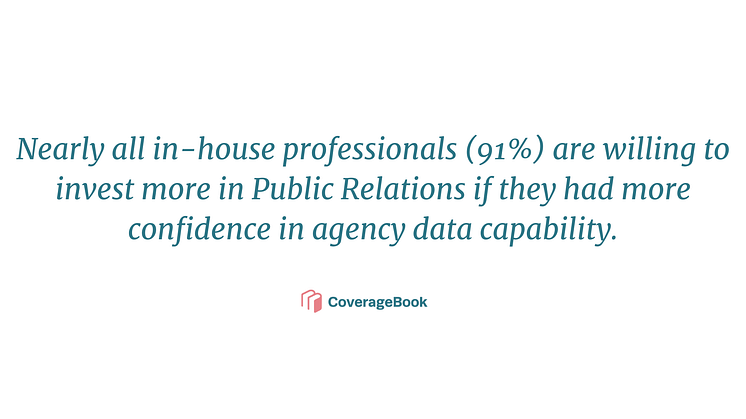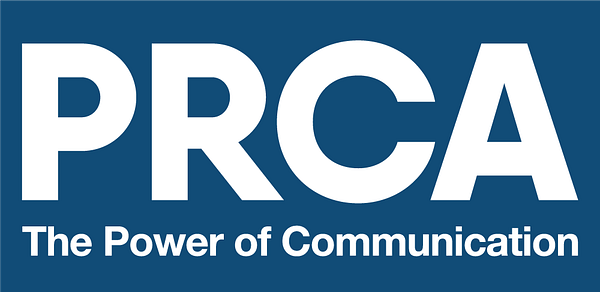
Press release -
Over half of PRs lack confidence in their data literacy skills
- Nearly half of PRs (44%) admit to presenting a metric they did not fully understand to a client.
- Nearly all in-house professionals (91%) are willing to invest more in Public Relations if they had more confidence in agency capability.
- As AVE becomes a thing of the past, new data from Coveragebook shows there is still some way to go before PRs are fully confident in discussing data.
New data from public relations (PR) industry reporting platform CoverageBook, which surveyed over 400 PR and marketing professionals, shows that over half (57%) of respondents lack confidence in their data literacy skills, with a similar number (44%) stating they had previously presented a metric they did not fully understand.
Responses from in-house professionals reflect this knowledge gap, with nearly all respondents in this sector (91%) willing to invest more, but only if agencies worked to build client confidence in their capabilities. That in comparison to the lack of confidence among agency teams presents the problem that needs to be solved. It’s clear that more PR budget would be readily available if agencies are able to upskill teams to meet client’s measurement expectations.
This research comes at a time when clients are putting increased scrutiny on PR teams to demonstrate impact. As we wave a (necessary) farewell to metrics such as AVE, PRs are now tasked with demonstrating the reach, engagement, and sentiment of coverage, as PR goes increasingly digital.
The data also revealed that, despite a lack of confidence in their own data literacy skills, the majority of PRs do not have anyone in an in-house data role (68%), or an external measurement team (98%). Crucially, 62% of directors lack confidence in their junior team’s data literacy, but nearly three-quarters of all managers and directors (71%) would be more likely to promote a junior member of the team with good data skills.
Over a third of PRs (34%) believe their agency has used Reach as a way to overstate or misrepresent PR results on more than one occasion, creating concern that there is a knowledge gap that suggests PRs are unable to demonstrate the quality of their coverage using data. The data shows that a quarter (26%) of respondents find data in PR and marketing complicated to understand, with a similar proportion actively avoiding spending time on data and evaluation tasks (24%).
Stella Bayles, director of marketing at CoverageBook says, “Our data shows that there is a clear problem here: data literacy skills in PR are low, and it’s impacting how PRs demonstrate results. More importantly, clients are noticing. Our findings make it clear that clients are willing to invest more into PR but only if agencies up their game when it comes to data literacy. At CoverageBook, we support professionals by providing credible and realistic metrics such as ‘estimated coverage views’ instead of inflated reach figures. We showcase data in a way both report creators and readers can understand; our main aim is to boost client buy-in and team confidence.”
Data in PR is crucial to demonstrating success and results. This research sheds light on current attitudes towards data in PR and marketing, and shows that there is work to be done on closing the knowledge gap. The responsibility lies with senior PR professionals to upskill and coach junior team members on data tools and measurement metrics that demonstrate the value and impact coverage can have.
By building a data culture within teams, PR professionals can improve data literacy while responding to client queries in a confident way, while showcasing their best results.
Topics
The Public Relations and Communications Association (PRCA) is the world’s largest professional PR body.
Representing 35,000 PR professionals in 82 countries worldwide, we are a global advocate for excellence in public relations. Our teams across Europe, the Middle-East and Asia-Pacific work with professionals around the world to co-ordinate our operations across six continents.
Our mission is to create a more professional, ethical, and prosperous PR industry. We champion - and enforce - professional standards around the world through our Professional Charter and Code of Conduct. The Code compels members to adhere to the highest standards of ethical practice.
We deliver exceptional training, authoritative industry data, and global networking, and development opportunities.
We also manage the International Communications Consultancy Organisation (ICCO) - the umbrella body for 41 PR associations and 3,000 agencies across the world. Additionally, we support the delivery of the Motor Industry Communicators Association (MICA).


